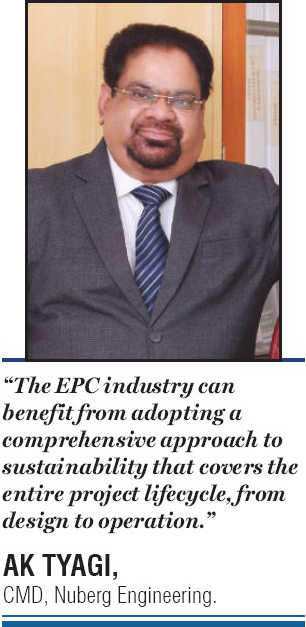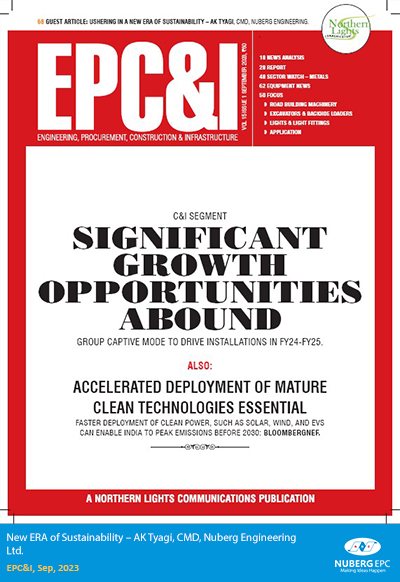Ushering in a new ERA of Sustainability
- AK Tyagi, CMD, Nuberg Engineering Limited
By adopting a forward-looking and proactive mindset, the industry can transform its challenges into opportunities and create a positive legacy for future generations, writes AK Tyagi.
EPC&I , September 2023
The engineering, procurement, and construction (EPC) industry is undergoing a profound transformation as it faces the challenges and opportunities of the 21st century. The industry is not only shedding the impacts of the COVID-19 pandemic but also adapting to the changing demands and expectations of its clients, stakeholders, and society at large.
The EPC industry is no longer just about delivering projects on time, within budget, and with quality. It is also about creating value for the future, ensuring environmental and social responsibility, and contributing to the global goals of sustainable development.
Sustainability is becoming a key driver of innovation and value creation in the EPC industry, as it seeks to deliver projects that are environmentally friendly, socially responsible, and economically viable.
The silver-lining of COVID-19 on the EPC industry
The COVID-19 crisis disrupted the global economy and affected various sectors, including the EPC industry. According to a report by S&P Global, public EPC companies dropped significantly more than average, reflecting the reduced demand and uncertainty in the market. The crisis has also exposed the vulnerabilities and inefficiencies of the traditional EPC business model, which relied heavily on fixed-price contracts, labour-intensive processes, and low digitalization.
However, the crisis has now created multiple opportunities for the EPC industry to accelerate its recovery and transformation. The industry moved fast and hard on productivity, rapidly reallocated resources, made bold moves, and invested heavily in digital technologies.

The EPC industry can, today, boast of best practices and a proactive and agile approach that overcome challenges and prepare for future contingency with long term outlook. The efficiencies thus gained have benefited all three stakeholders – Public at large with more sustainable infrastructure, clients with better timelines, lower maintenance costs, and the EPC industry with better margins, improved predictability, and more engaged workforce.
The shift to sustainability
Beyond the short-term impact of the pandemic, the EPC industry is also facing long-term shifts in supply and demand, resulting in lasting changes in investment patterns. A combination of increasingly stringent sustainability requirements, rising cost pressure, labour scarcity, and new available materials, production approaches, and digital tools are forcing the industry to innovate.
Sustainability is becoming a key factor that influences the decisions and preferences of clients, investors, regulators, and consumers. According to a survey by McKinsey, more than 70 per cent of respondents across regions said that addressing climate change was either somewhat or very important to them.
Moreover, sustainability is not only about reducing environmental impacts, but also about creating social value and enhancing economic performance. The EPC industry can benefit from adopting a comprehensive approach to sustainability that covers the entire project lifecycle, from design to operation.
Some examples of how sustainability can drive innovation and value creation in the EPC industry are:
- Designing projects that minimize energy consumption, carbon emissions, water usage, and waste generation, while maximizing resource efficiency, resilience, and adaptability.
- Using renewable energy sources, such as solar, wind or biomass, to power construction sites and operations.
- Applying circular economy principles, such as reuse, recycle and regenerate, to optimize material flows and reduce waste.
- Leverage digital technologies, such as artificial intelligence (AI), big data analytics, cloud computing, internet of things (IoT), robotics, and 3D printing, to enhance productivity, quality, safety, and transparency.
- Engaging with local communities and stakeholders to understand their needs and expectations, and to create positive social impacts through job creation, skill development, education, and health.
The future of the EPC Industry
The EPC industry is at a critical juncture where it can either embrace or resist the changes brought by sustainability agenda. The industry has a unique opportunity to reinvent itself and become a leader in delivering sustainable solutions for the world’s most pressing challenges. However, to do so, the EPC industry needs to develop five vital characteristics that will define its success in the next decade:
- Agility: The ability to respond quickly and effectively to changing market conditions, customer demands, and technological advancements.
- Collaboration: The ability to work together with clients, partners, suppliers, and stakeholders across disciplines, geographies, and sectors.
- Innovation: The ability to generate innovative ideas, solutions, and business models that create value for customers and society.
- Excellence: The ability to deliver projects that meet or exceed quality standards, time schedules, and budget constraints.
- Responsibility: The ability to act ethically and accountably for the environmental, social, and economic impacts of projects.

The EPC industry has a vital role to play in ushering in the new era of sustainability. By adopting a forward-looking and proactive mindset, the industry can transform its challenges into opportunities and create a positive legacy for future generations.
One of the leading players in the EPC industry that is embracing change and setting an example for others is Nuberg EPC, a global EPC and turnkey project management company with specialization in chemical plants. Nuberg EPC has a vision to be a world-class EPC company that delivers innovative, efficient, and sustainable solutions for its clients. It has a mission to create value for its clients by providing them with cuttingedge technology, engineering excellence, project management expertise, and operational excellence. Nuberg EPC has a strong focus on sustainability and climate change, which is evident from its various initiatives and achievements in this domain.
Nuberg EPC has been implementing and delivering various sustainability initiatives across its value chain and has been recognized and awarded for its sustainability achievements by various national and international organizations.
© This article was first published in EPC&I, September 2023
Download PDF



